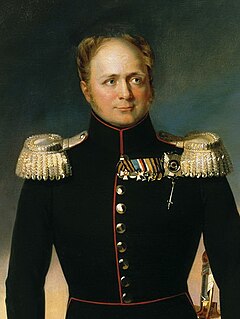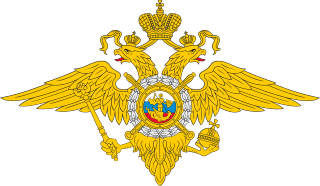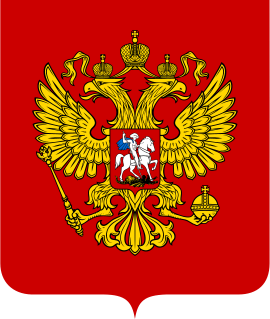This article may be expanded with text translated from the corresponding article in Russian. (March 2012)Click [show] for important translation instructions.
|
This article does not cite any sources .(December 2009) (Learn how and when to remove this template message) |

The early Russian system of government instituted by Peter the Great, which consisted of various state committees, each named Collegium with subordinate departments named Prikaz , was largely outdated by the 19th century. The responsibilities of the Collegia were chosen very randomly and often overlapped.

Russia, officially the Russian Federation, is a transcontinental country in Eastern Europe and North Asia. At 17,125,200 square kilometres (6,612,100 sq mi), Russia is by a considerable margin the largest country in the world by area, covering more than one-eighth of the Earth's inhabited land area, and the ninth most populous, with about 146.77 million people as of 2019, including Crimea. About 77% of the population live in the western, European part of the country. Russia's capital, Moscow, is one of the largest cities in the world and the second largest city in Europe; other major cities include Saint Petersburg, Novosibirsk, Yekaterinburg and Nizhny Novgorod. Extending across the entirety of Northern Asia and much of Eastern Europe, Russia spans eleven time zones and incorporates a wide range of environments and landforms. From northwest to southeast, Russia shares land borders with Norway, Finland, Estonia, Latvia, Lithuania and Poland, Belarus, Ukraine, Georgia, Azerbaijan, Kazakhstan, China, Mongolia and North Korea. It shares maritime borders with Japan by the Sea of Okhotsk and the U.S. state of Alaska across the Bering Strait. However, Russia recognises two more countries that border it, Abkhazia and South Ossetia, both of which are internationally recognized as parts of Georgia.

Peter the Great, Peter I or Peter Alexeyevich ruled the Tsardom of Russia and later the Russian Empire from 7 May [O.S. 27 April] 1682 until his death in 1725, jointly ruling before 1696 with his elder half-brother, Ivan V. Through a number of successful wars, he expanded the Tsardom into a much larger empire that became a major European power and also laid the groundwork for the Russian navy after capturing ports at Azov and the Baltic Sea. He led a cultural revolution that replaced some of the traditionalist and medieval social and political systems with ones that were modern, scientific, Westernised and based on the Enlightenment. Peter's reforms made a lasting impact on Russia, and many institutions of Russian government trace their origins to his reign. He is also known for founding and developing the city of Saint Petersburg, which remained the capital of Russia until 1917.

The collegia were government departments in Imperial Russia, established in 1717 by Peter the Great. The departments were housed in the Twelve Collegia building in Saint Petersburg.
Soon after Alexander I inherited the throne in 1801, he formed a Privy Committee (Негласный комитет) which consisted of Viktor Kochubey, Nikolay Novosiltsev, Pavel Stroganov and Adam Jerzy Czartoryski. Mikhail Speransky took an active part in the Committee, although he was not a formal member.

Alexander I was the Emperor of Russia between 1801 and 1825. He was the eldest son of Paul I and Sophie Dorothea of Württemberg. Alexander was the first king of Congress Poland, reigning from 1815 to 1825, as well as the first Russian Grand Duke of Finland, reigning from 1809 to 1825.

Count Viktor Pavlovich Kochubey was a Russian statesman and a close aide of Alexander I of Russia. Of Ukrainian birth, he was a great-grandson of Vasily Kochubey. He took part in the Privy Committee that outlined Government reform of Alexander I. He served in London and Paris embassies as counsel, then Ambassador to Turkey. In 1798 he was appointed to the board of College of Foreign Affairs and was created Count next year, but then Paul I of Russia exiled him. At the start of the reign of Alexander I of Russia, he joined the liberal Privy Committee that outlined Government reform of Alexander I. He was the Minister of Foreign Affairs in 1801–1802 and also Minister of the Interior until 1812, then in 1819–1825. Since 1827 he was the President of the State Council and Chairman of the Committee of Ministers. In 1834, he was granted the rank of Chancellor of the Russian Empire.

Count Nikolay Nikolayevich Novosiltsev (1761–1838) was a Russian statesman and a close aide to Alexander I of Russia.
The reforms proposed by Speransky were to introduce a parliament and a State Council as legislative and executive bodies of the Tsar and to relieve the Governing Senate of these functions, transforming it to a kind of Supreme Court. Speransky even prepared the Constitution project. The reforms were stopped by 1810 because of the Napoleonic wars and growing resistance from conservative nobility, as voiced by Nikolai Karamzin.

The Governing Senate was a legislative, judicial, and executive body of the Russian Emperors, instituted by Peter the Great to replace the Boyar Duma and lasted until the very end of the Russian Empire. It was chaired by the Procurator General, who served as the link between the sovereign and the Senate; he acted, in the emperor's own words, as "the sovereign's eye".
The supreme court is the highest court within the hierarchy of courts in many legal jurisdictions. Other descriptions for such courts include court of last resort, apex court, and highcourt of appeal. Broadly speaking, the decisions of a supreme court are not subject to further review by any other court. Supreme courts typically function primarily as appellate courts, hearing appeals from decisions of lower trial courts, or from intermediate-level appellate courts.
On September 8, 1802 Alexander issued the Manifesto according to which following ministries had been founded on the basis of the Administration of State Affairs:
- Military Land Forces
- Naval Forces
- Foreign Affairs
- Justice
- Internal Affairs
- Finances
- Commerce
- Education
The Manifesto facilitated the formation of the Russian state and unified the system of the executive power bodies.
The current Ministry of Defense, the Ministry of Foreign Affairs, the Ministry of Justice, the Ministry of Internal Affairs, the Ministry of Finances, the Ministry of Economic Development and Trade, the Ministry of Education of the Russian Federation are indirect successors of the Ministries founded according to the Manifesto of Alexander I.

The Ministry of Foreign Affairs of the Russian Federation is the central government institution charged with leading the foreign policy and foreign relations of Russia. It is a continuation of the Ministry of Foreign Affairs of the Russian Soviet Federative Socialist Republic, which was under the supervision of the Soviet Ministry of External Relations. Sergei Lavrov is the current foreign minister.
A Ministry of Justice is a common type of government department that serves as a justice ministry.

The Ministry of Internal Affairs of the Russian Federation is the interior ministry of Russia. Emperor Alexander I of Russia founded its predecessor in 1802 in Imperial Russia. The Ministry has its headquarters in Moscow.











